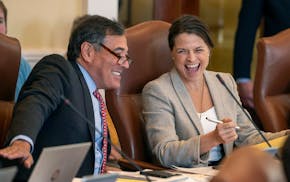Like an inkblot test, reactions to Gov. Mark Dayton's budget depended on who was looking at it.
Republicans zeroed in on the tax provisions in the proposal, which included expanding the sales tax to goods and services ranging from baby aspirin to haircuts.
"I don't know how you can say you're going to collect $2 billion more in sales tax and not have the people of the state pay that," said Senate Minority Leader David Hann, R-Eden Prairie. "If you go out and get an oil change on your car, you're going to pay a sales tax on it. If you go out and get a haircut, you're going to pay a sales tax. If you join a health club. Those are things you are not paying sales tax on now."
At the progressive coalition TakeAction Minnesota, executive director Dan McGrath applauded the tax changes.
"Minnesotans understand that we're all a part of the same team and new investments won't happen without new revenue," McGrath said in a statement. "We thank Governor Dayton for his tenaciousness and vision in doing what is right for our state, not what is necessarily easy."
Minnesota AFL-CIO President Shar Knutson said the governor's budget "puts middle-class Minnesotans first."
"This budget is a great first step in restoring prosperity and expanding the middle class," she said in a statement.
While some groups looked at the overall budget picture, others drilled down to find the provisions that directly affected their livelihoods.
The Minnesota State Bar Association dubbed the governor's proposed sales tax on legal services a "misery tax."
"Individuals and families often need to hire lawyers when they are vulnerable and suffering," Bar Association President Robert Engler said in a statement. "A sales tax on legal services would push citizens to either forgo their legal rights or attempt to represent themselves in the complex justice system."
Leaders of both public higher education systems welcomed the budget, which increased higher education spending by $240 million -- enough to fund a two-year tuition freeze at the University of Minnesota and to institute $51 million worth of workforce training programs at the Minnesota State Colleges and Universities System.
Staff writer Jenna Ross contributed to this report. Jennifer Brooks • 651-925-5049
The Latest | 12 jurors seated in Trump hush money case, selection of alternates ongoing

Rep. Ilhan Omar's daughter suspended from college for involvement in pro-Palestinian protests

